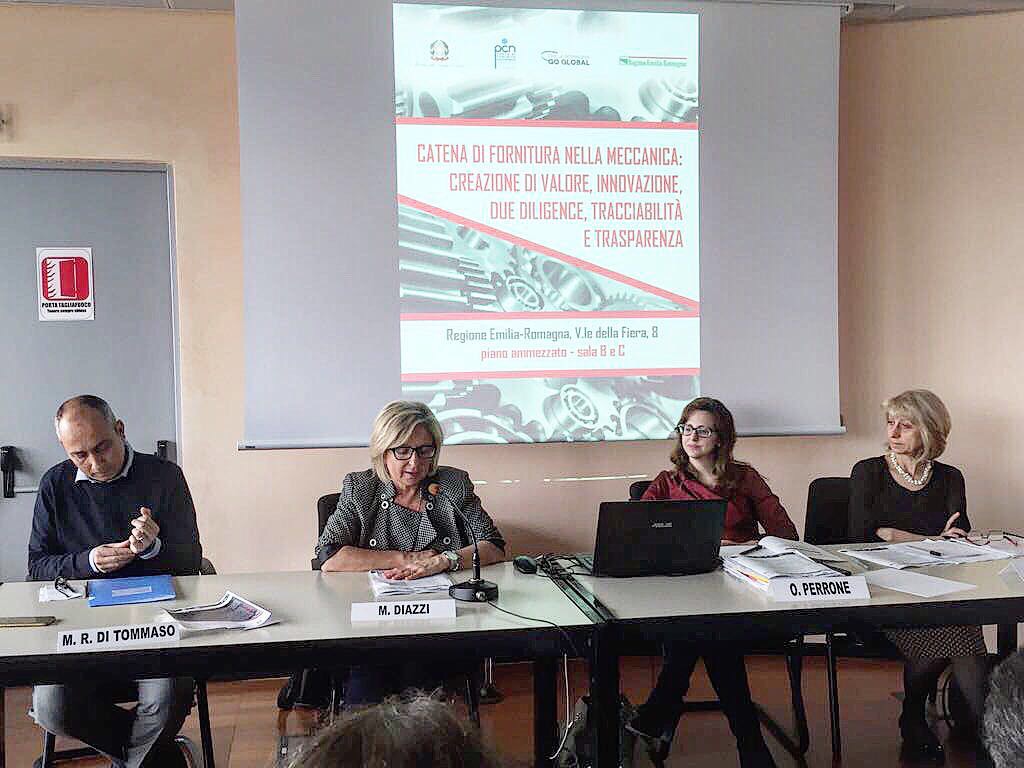 On Thursday April 6th, at the Headquarters of Emilia-Romagna Region, we participated to the event Supply Chain in the Mechanical Field: Creation of Value, Innovation, Due Diligence, Traceability and Transparency.
On Thursday April 6th, at the Headquarters of Emilia-Romagna Region, we participated to the event Supply Chain in the Mechanical Field: Creation of Value, Innovation, Due Diligence, Traceability and Transparency.
Numerous points of view were involved in the meeting: they all agreed with the importance companies adopt a sustainable stakeholders supply chain aiming at the creation of social development and of local well-being.
The OCSE Guidelines
They consist in a detailed programme of good practises for the companies which, connected into virtuous networks, create value in collaboration with institutions and civil society. Global perspective involves the good quality of relationships and the uniqueness of the territories. Therefore, the humanistic reflection and interpretation of business relationships and culture becomes essential at a local level. Furthermore, the OCSE guidelines consider an alternative way for companies to adopt responsible behaviours sustained by the integration of business sustainable approaches in the management of the supply chain: legal protection, innovation and quality are its key words.
A stakeholders inclusive policy means they are listed and involved in the communication processes of also non financial activities by an explicit supply chain: this first of all requires a consideration of the company identity in the view of the heritage of knowledge derived from local territory.
The Speeches
The moderator Morena Diazzi, Emilia-Romagna Region General Director of Economy of Knowledge, Work and Business Company, guaranteed the commitment of the regional administration in the promotion of sustainable actions recommended by OCSE and considered the priority of training for human resources who are, first of all, aware citizens and people.
Aepi Engineer Marco Liverani agreed with Diazzi: training and specialization as CSR activities are an authentic know-how to be transmitted and exported. In the opinion of Marco Rodolfo Di Tommaso, Industrial Economy and Politics Full Professor at the University of Ferrara, the enlargement and the qualification of the agents of the supply chain is both a local (at micro level) and a global (at macro level) necessity to be realized in network.
Therefore, Oriana Perrone, Economic Specialist at the Economic Development Ministry and representing the PCN National Contact Point for the National CSR, pointed out OCSE guidelines determine a general well-being for people and citizens as well as social innovation.
Lucrezia Songini, Business Companies Management Planning and Control Professor at the University of Piemonte, stated CSR is a total voluntary and fair approach each company should act towards its stakeholders, environment and society.
Giovanni Bisogni, Supplier Management Director of Tetrapak, affirmed the importance for his enterprise of a sustainable supply chain, aiming at a mutual growth between company and suppliers.
The Principles of Sustainability and the 2030 Agenda
OCSE guidelines are fully in compliance with a sustainable perspective, where social evolution spreads itself starting from the micro-local to a macro-global dimension: local initiative allows universal harmony and equilibrium. The bio imitation principle needs a closed economic cycle: CSR means economic effects and consequences should be for those companies which produce them and not for stakeholders. Analogously, supply chain sustainability conforms to the goals of 2030 Agenda: particularly, to the goals 8 (incentivize an economic, durable, inclusive and sustainable growth), 9 (promoting innovation and a fair, responsible, sustainable industrialization), 12 (guaranteeing sustainable models of production and consumption) and 17 (strengthen the means of realization and renovating the world partnership for the sustainable development).
A New Criterion of Competitiveness
Business companies economic competitiveness can be measured through the respect of sustainability and CSR practises. In this very perspective, OCSE guidelines for the sustainable supply chain are a crucial factor for local companies heading for a better strategic positioning and competitive differentiation matching global markets.
We also believe a creation of value is possible through the proliferation of connections among involved actors and a sustainable supply chain should be always more enlarged and participated also including institutions. This conviction guides us in the promotion of a new economic sustainable model for both us and the others.
RIVOLUZIONE EVOLUZIONE
La transizione a modelli di business sostenibili è solo questione di tempo. Le organizzazioni, le imprese e le pubbliche amministrazioni che scelgono già da ora